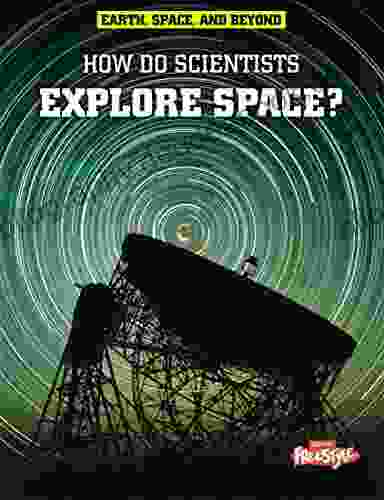How Do Scientists Explore Space: Earth, Space, and Beyond

Humans have always been fascinated by the stars and the vast expanse of space beyond our planet. In the past few centuries, we have made great strides in our understanding of the universe, thanks to the work of scientists who explore space.
5 out of 5
| Language | : | English |
| File size | : | 39067 KB |
| Text-to-Speech | : | Enabled |
| Screen Reader | : | Supported |
| Enhanced typesetting | : | Enabled |
| Word Wise | : | Enabled |
| Print length | : | 48 pages |
There are many different ways that scientists explore space. Some of the most common methods include:
- Telescopes: Telescopes are used to collect and focus light from distant objects in space. This allows scientists to see objects that are too faint or too far away to be seen with the naked eye.
- Satellites: Satellites are artificial objects that orbit the Earth or other planets. They are used for a variety of purposes, including communication, navigation, and weather forecasting. Satellites can also be equipped with scientific instruments to collect data about the Earth, the atmosphere, and the space environment.
- Probes: Probes are spacecraft that are sent to explore other planets, moons, and asteroids. They are equipped with scientific instruments to collect data about the target object, such as its composition, atmosphere, and surface features.
- Human spaceflight: Human spaceflight is the most direct way to explore space. Astronauts can conduct experiments, collect samples, and repair satellites and other spacecraft. Human spaceflight is also essential for the construction and maintenance of space stations and other long-term space habitats.
These are just a few of the many ways that scientists explore space. As our technology continues to improve, we will be able to explore even further into the universe and learn more about our place in it.
Earth
The Earth is our home planet, and it is the only planet in the solar system known to support life. Scientists have been exploring the Earth for centuries, and we have learned a great deal about its history, composition, and climate. In recent years, scientists have also begun to explore the Earth's oceans, which cover over 70% of the planet's surface.
One of the most important ways that scientists explore the Earth is through the use of satellites. Satellites can be used to collect data about the Earth's atmosphere, oceans, land surfaces, and ice caps. This data can be used to track changes in the Earth's climate, monitor natural disasters, and manage natural resources.
In addition to satellites, scientists also use a variety of other methods to explore the Earth. These methods include:
- Field research: Field research involves scientists going out into the field to collect data about the Earth. This can include studying the geology of a particular area, collecting samples of plants and animals, or measuring the air quality.
- Laboratory experiments: Laboratory experiments involve scientists conducting experiments in a controlled environment to learn more about the Earth's processes. This can include studying the effects of climate change on plants or animals, or testing the effectiveness of new pollution control technologies.
- Computer modeling: Computer modeling involves scientists using computers to create models of the Earth's systems. These models can be used to simulate different scenarios and predict how the Earth will change in the future.
By using a variety of methods, scientists are able to learn more about the Earth and how it works. This knowledge is essential for protecting our planet and ensuring a sustainable future for humanity.
Space
Space is the vast expanse that surrounds the Earth and other planets. It is a vacuum, meaning that it contains no air or other matter. Space is also very cold, with temperatures reaching -270 degrees Celsius (-454 degrees Fahrenheit) in some areas.
Scientists have been exploring space for centuries, but it was not until the 20th century that we began to真正understand the vastness and complexity of space. In the past few decades, scientists have made great strides in our understanding of the solar system, the Milky Way galaxy, and the universe beyond.
One of the most important ways that scientists explore space is through the use of telescopes. Telescopes allow scientists to collect and focus light from distant objects in space. This allows us to see objects that are too faint or too far away to be seen with the naked eye.
In addition to telescopes, scientists also use a variety of other methods to explore space. These methods include:
- Satellites: Satellites are artificial objects that orbit the Earth or other planets. They are used for a variety of purposes, including communication, navigation, and weather forecasting. Satellites can also be equipped with scientific instruments to collect data about the space environment.
- Probes: Probes are spacecraft that are sent to explore other planets, moons, and asteroids. They are equipped with scientific instruments to collect data about the target object, such as its composition, atmosphere, and surface features.
- Human spaceflight: Human spaceflight is the most direct way to explore space. Astronauts can conduct experiments, collect samples, and repair satellites and other spacecraft. Human spaceflight is also essential for the construction and maintenance of space stations and other long-term space habitats.
By using a variety of methods, scientists are able to learn more about space and how it works. This knowledge is essential for understanding our place in the universe and for developing new technologies that will allow us to explore space further.
Beyond
The universe is vast and mysterious, and there is still much that we do not know about it. Scientists are constantly exploring beyond our solar system, using telescopes, satellites, and probes to learn more about the galaxies, stars, and planets that make up the universe.
One of the most important ways that scientists are exploring beyond our solar system is through the use of telescopes. Telescopes allow scientists to collect and focus light from distant objects in space. This allows us to see objects that are billions of light-years away.
In addition to telescopes, scientists also use a variety of other methods to explore beyond our solar system. These methods include:
- Satellites: Satellites are artificial objects that orbit the Earth or other planets. They are used for a variety of purposes, including communication, navigation, and weather forecasting. Satellites can also be equipped with scientific instruments to collect data about the space environment.
- Probes: Probes are spacecraft that are sent to explore other planets, moons, and asteroids. They are equipped with scientific instruments to collect data about the target object, such as its composition, atmosphere, and surface features.
- Human spaceflight: Human spaceflight is the most direct way to explore space. Astronauts can conduct experiments, collect samples,
5 out of 5
| Language | : | English |
| File size | : | 39067 KB |
| Text-to-Speech | : | Enabled |
| Screen Reader | : | Supported |
| Enhanced typesetting | : | Enabled |
| Word Wise | : | Enabled |
| Print length | : | 48 pages |
Do you want to contribute by writing guest posts on this blog?
Please contact us and send us a resume of previous articles that you have written.
 Book
Book Novel
Novel Chapter
Chapter Text
Text Story
Story Library
Library Paperback
Paperback Paragraph
Paragraph Bookmark
Bookmark Shelf
Shelf Bibliography
Bibliography Preface
Preface Synopsis
Synopsis Annotation
Annotation Footnote
Footnote Manuscript
Manuscript Scroll
Scroll Bestseller
Bestseller Classics
Classics Library card
Library card Narrative
Narrative Autobiography
Autobiography Encyclopedia
Encyclopedia Dictionary
Dictionary Narrator
Narrator Character
Character Librarian
Librarian Archives
Archives Periodicals
Periodicals Study
Study Scholarly
Scholarly Lending
Lending Reserve
Reserve Academic
Academic Literacy
Literacy Study Group
Study Group Thesis
Thesis Awards
Awards Theory
Theory Textbooks
Textbooks Vincent E Henry
Vincent E Henry Lilly Jones
Lilly Jones Lisa Fortini Campbell
Lisa Fortini Campbell Anthony Slayton
Anthony Slayton William J Federer
William J Federer Steven Butler
Steven Butler Anita Stafford
Anita Stafford Tom Karako
Tom Karako Don Nardo
Don Nardo Shirley Rousseau Murphy
Shirley Rousseau Murphy F A Hayek
F A Hayek Rose Mary Parker
Rose Mary Parker Patricia L Woodard
Patricia L Woodard Marcy Dermansky
Marcy Dermansky Anne Peterson
Anne Peterson Joel Chandler Harris
Joel Chandler Harris Diane D Knott
Diane D Knott Isaiyan Morrison
Isaiyan Morrison Anita Gray
Anita Gray Dan Roodt
Dan Roodt
Light bulbAdvertise smarter! Our strategic ad space ensures maximum exposure. Reserve your spot today!

 Heath PowellReleased: An Exploration of Anita Brookner's Profound Musings on Art, Loss,...
Heath PowellReleased: An Exploration of Anita Brookner's Profound Musings on Art, Loss,... Colton CarterFollow ·9.2k
Colton CarterFollow ·9.2k Albert ReedFollow ·19.7k
Albert ReedFollow ·19.7k Reed MitchellFollow ·15.8k
Reed MitchellFollow ·15.8k Dallas TurnerFollow ·19.1k
Dallas TurnerFollow ·19.1k Jarrett BlairFollow ·17.2k
Jarrett BlairFollow ·17.2k Braeden HayesFollow ·5.6k
Braeden HayesFollow ·5.6k Eli BrooksFollow ·13.5k
Eli BrooksFollow ·13.5k Albert CamusFollow ·17.1k
Albert CamusFollow ·17.1k

 Braden Ward
Braden WardFeminism's Forgotten Fight: The Ongoing Battle for...
The feminist movement has historically...

 Julio Cortázar
Julio CortázarBlue Heaven Black Night: A Literary Journey Through Love,...
In the realm of...

 Eddie Bell
Eddie BellA Journey Through Time: Exploring the Enchanting World of...
The vibrant tapestry of New...

 Lawrence Bell
Lawrence BellValiance Dragon Soul Press Anthology: A Literary Odyssey...
Step into a realm where...

 Aron Cox
Aron CoxEmbark on a Creative Odyssey with Jean Leinhauser's "101...
Unveil a Kaleidoscope of...
5 out of 5
| Language | : | English |
| File size | : | 39067 KB |
| Text-to-Speech | : | Enabled |
| Screen Reader | : | Supported |
| Enhanced typesetting | : | Enabled |
| Word Wise | : | Enabled |
| Print length | : | 48 pages |












